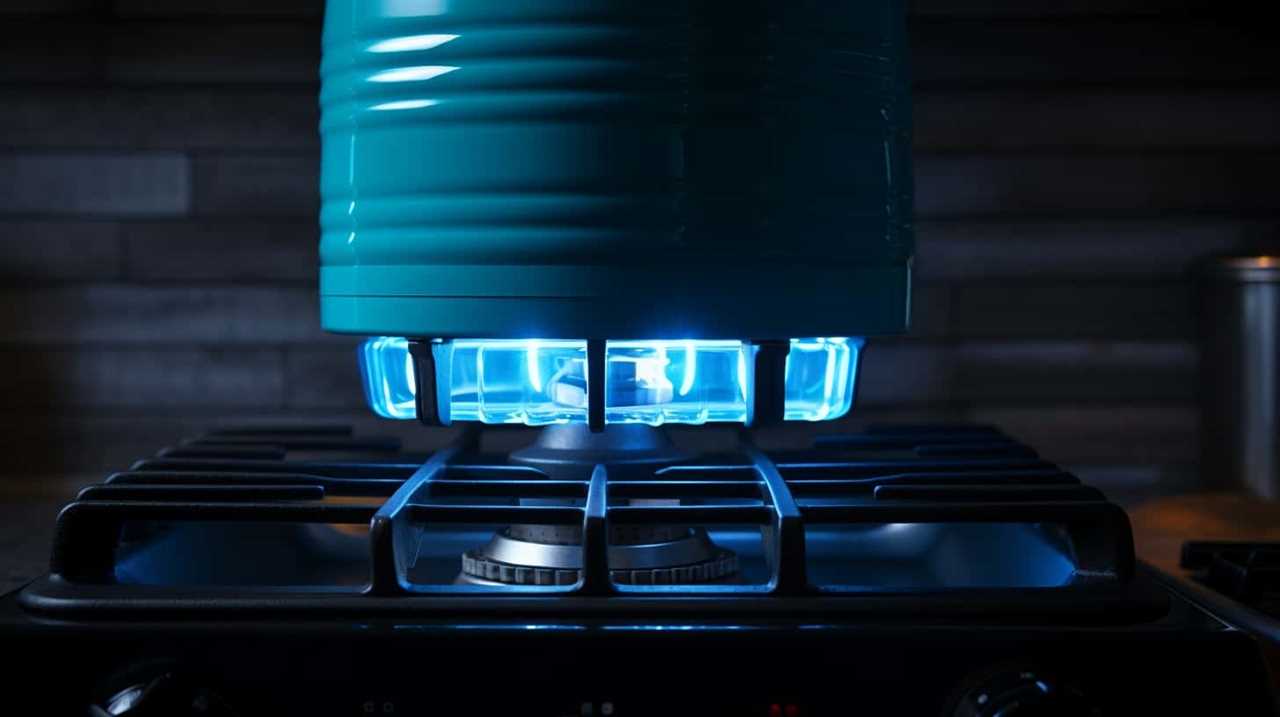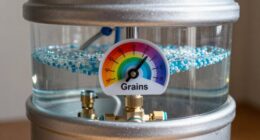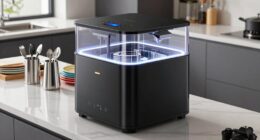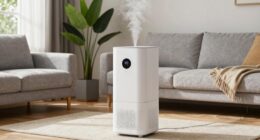Are you aware that household appliances equipped with sensors are gaining popularity? These cutting-edge devices utilize advanced technology to improve our daily routines.
From smart refrigerators that can create shopping lists to motion-sensing lighting that illuminates our path, these appliances are revolutionizing the way we interact with our homes.
In this article, we will explore the top household appliances that utilize sensors and learn how they can make our lives more convenient and efficient.
Get ready to dive into the world of cutting-edge home automation!

Key Takeaways
- Smart refrigerators revolutionize food storage and management by allowing remote control and monitoring of the fridge, providing real-time updates on food inventory and expiration dates, and suggesting recipes based on available ingredients.
- Wi-Fi-enabled thermostats enable remote control and monitoring of home temperature, compatibility with other smart home devices, energy efficiency, reduced utility bills, and customized scheduling for temperature settings.
- Automated cleaning appliances, such as motion-sensing lighting and automatic vacuum cleaners, offer increased security, energy efficiency, time-saving convenience, efficient cleaning performance, and the ability to reach difficult-to-access areas.
- Sensor-equipped washing machines optimize water usage, prevent detergent wastage, automatically adjust cycles, and save time, water, energy, and detergent.
Smart Refrigerators
Smart refrigerators have been revolutionizing the way we store and manage our food for the past few years. These innovative appliances are a crucial component of the smart kitchen concept, which aims to create an interconnected and efficient cooking environment.
Smart refrigerators are equipped with advanced features that allow users to control and monitor their fridge remotely, ensuring optimal food storage conditions. By connecting to the internet, these appliances can provide real-time updates on food inventory, expiration dates, and even suggest recipes based on the available ingredients.
With the integration of smart technology, these refrigerators offer convenience and efficiency, allowing users to save time and reduce waste. Furthermore, smart refrigerators contribute to energy conservation by optimizing cooling settings based on usage patterns.
As connected appliances, smart refrigerators are transforming the way we interact with our kitchen and make informed decisions about our food.

Wi-Fi-Enabled Thermostats
Moving on to the next household appliance that uses sensors, how do Wi-Fi-enabled thermostats improve our home comfort and energy efficiency? Wi-Fi-enabled thermostats are a significant advancement in home automation and energy management systems. With these thermostats, we can remotely control and monitor our home’s temperature settings through a smartphone or computer. This allows us to adjust the temperature even when we are away from home, ensuring comfort and energy efficiency. Additionally, these thermostats often come with compatibility features that allow them to seamlessly integrate with other smart home devices, such as voice assistants or smart speakers. This integration enables a more comprehensive and intuitive control over the entire home automation system. Overall, Wi-Fi-enabled thermostats provide a convenient and efficient way to manage our home’s temperature, improving our comfort and reducing energy waste.
| Features | Benefits |
|---|---|
| Remote temperature control | Adjust temperature settings from anywhere |
| Wi-Fi thermostat compatibility | Seamlessly integrate with other smart devices |
| Energy efficiency | Reduce energy waste and lower utility bills |
| Customized scheduling | Set temperature schedules to suit your routine |
| Energy usage monitoring | Track and optimize energy consumption |
Motion-Sensing Lighting
Continuing our exploration of household appliances that use sensors, let’s now delve into motion-sensing lighting and how it enhances our home automation and energy efficiency.
Motion-sensing lighting, also known as smart lighting, utilizes motion sensors to detect the presence or movement of people within a room or area. This technology offers several benefits, including increased security and energy savings.
Motion sensing security allows for automatic lighting activation when someone enters a room, ensuring a well-lit environment and deterring potential intruders. Additionally, smart lighting systems can be integrated with other home automation devices, such as thermostats and security systems, providing a seamless and convenient experience.

By automatically turning off lights when no motion is detected, motion-sensing lighting contributes to energy efficiency and reduces electricity consumption.
Now, let’s move on to the next topic of our discussion: automatic vacuum cleaners.
Automatic Vacuum Cleaners
Automatic vacuum cleaners, also known as robotic vacuums, are a prime example of household appliances that utilize sensor technology.
These innovative devices are equipped with various sensors that enable them to navigate and clean a room autonomously.

The benefits of automated cleaning include time-saving convenience, efficient cleaning performance, and the ability to reach difficult-to-access areas.
Sensor Technology in Vacuums
Our research shows that many households rely on automatic vacuum cleaners for their cleaning needs. Sensor technology in vacuums, specifically the advancement of smart sensors, has revolutionized the way these appliances operate.
Smart sensors in vacuums are designed to detect obstacles and adjust their cleaning path accordingly, ensuring efficient and thorough cleaning. These sensors use a combination of infrared, ultrasonic, and vision-based technologies to accurately perceive the environment and navigate around furniture, walls, and other objects.
The continuous development and improvement of sensor technology have led to more precise mapping and localization capabilities, allowing vacuums to clean even large and complex areas with minimal human intervention. With the advancements in sensor technology, automated vacuum cleaners have become highly effective and reliable cleaning tools, providing convenience and saving time for users.

Now, let’s explore the benefits of automated cleaning.
Benefits of Automated Cleaning
As we delve into the benefits of automated cleaning, it’s important to note the significant contribution that automatic vacuum cleaners have made in revolutionizing household cleaning. These devices haven’t only improved hygiene levels in homes but also provided time-saving benefits for users. Here are four key advantages of using automatic vacuum cleaners:
- Improved hygiene: Automatic vacuum cleaners are equipped with advanced sensors that can detect and remove dirt, dust, and allergens from various surfaces. This helps to create a cleaner and healthier living environment for individuals and families.
- Time-saving benefits: With their automated cleaning capabilities, these devices can autonomously navigate through rooms and clean floors without the need for manual intervention. This frees up valuable time for users to focus on other tasks or enjoy leisure activities.
- Efficient cleaning: Automatic vacuum cleaners are designed to efficiently clean different types of flooring, including carpets, hardwood, and tiles. They use intelligent algorithms to optimize cleaning patterns and ensure thorough coverage of the entire area.
- Convenience: Users can schedule cleaning sessions or control the device remotely through smartphone apps, making it convenient to maintain cleanliness even when they aren’t at home.
Sensor-Equipped Washing Machines
Sensor-equipped washing machines offer several advantages in terms of improved laundry efficiency, enhanced cleaning performance, and energy-saving features.
By utilizing sensors, these machines are able to automatically adjust water levels, detergent usage, and wash cycles based on the load size and fabric type, resulting in more efficient and effective cleaning.

Additionally, sensors can detect the level of dirtiness in the laundry and adjust the wash cycle accordingly, ensuring that clothes are thoroughly cleaned while minimizing water and energy waste.
Improved Laundry Efficiency
By implementing sensor technology, we’ve greatly enhanced the efficiency of laundry through the use of washing machines. These sensor-equipped machines offer a range of benefits that contribute to improved laundry efficiency:
- Optimized water usage: Sensors detect the size of the load and adjust the water level accordingly, ensuring that the right amount of water is used for each load.
- Precise detergent dispensing: Sensors measure the weight of the load and dispense the perfect amount of detergent, preventing wastage and ensuring optimal cleaning.
- Automatic cycle adjustment: Sensors monitor factors such as soil level and fabric type, automatically adjusting the cycle length, temperature, and agitation intensity for the best cleaning results.
- Energy-saving features: Sensors can detect when clothes are dry, preventing over-drying and reducing energy consumption.
With these advancements, sensor-equipped washing machines provide improved laundry efficiency, saving time, water, energy, and detergent.
Now let’s explore how these machines also deliver enhanced cleaning performance.

Enhanced Cleaning Performance
We have found that sensor-equipped washing machines greatly enhance the cleaning performance of laundry. These machines utilize advanced sensors to detect the size and type of clothes, as well as the amount of dirt present. By accurately assessing these factors, the washing machine can adjust the water temperature, detergent usage, and wash cycle duration to optimize cleaning efficiency.
The sensors also enable the machine to detect unbalanced loads and make necessary adjustments to ensure thorough cleaning. In addition to improved cleaning performance, sensor-equipped washing machines also offer other benefits such as energy and water efficiency. They can save valuable resources by using only the required amount of water and energy based on the load size and dirt level.
Energy-Saving Features
One notable feature of sensor-equipped washing machines is their energy-saving capabilities. These machines are designed to optimize energy consumption and reduce waste. Here are some energy-saving features found in sensor-equipped washing machines:
- Energy consumption monitoring: Washing machines with sensors can track and monitor energy usage during each cycle. This allows users to have a better understanding of the energy consumed and make informed decisions to minimize energy waste.
- Adaptive lighting control: Sensor-equipped washing machines can adjust the brightness of their display panels based on the surrounding lighting conditions. This helps to conserve energy by reducing unnecessary power consumption when the display isn’t in use.
- Load sensing technology: These machines use sensors to detect the size and weight of the laundry load. By accurately determining the load size, the machine can adjust the water and detergent levels accordingly, resulting in energy savings.
- Delay start feature: Sensor-equipped washing machines often come with a delay start option. This feature allows users to schedule the start of the washing cycle during off-peak hours when energy rates are lower, helping to reduce overall energy costs.
Intelligent Ovens and Stoves
Intelligent ovens and stoves incorporate sensor technology to enhance cooking precision and efficiency. These advanced appliances utilize integrated temperature control to maintain an accurate and consistent cooking environment. By continuously monitoring the temperature inside the oven or stove, the sensors can adjust the heat output accordingly, ensuring optimal cooking results.

Moreover, intelligent ovens and stoves also offer voice-activated cooking capabilities, allowing users to control the appliance through voice commands. This feature not only adds convenience but also improves safety by eliminating the need for physical interaction with the appliance while cooking.
With sensor technology, these intelligent ovens and stoves offer a level of cooking mastery that ensures precise and efficient cooking every time, making them an essential addition to any modern kitchen.
Smart Dishwashers
Moving on to smart dishwashers, these appliances utilize sensor technology to enhance cleaning efficiency and convenience in the kitchen. With the integration of advanced sensors, smart dishwashers offer a range of features that make dishwashing a breeze.
Here are some notable advancements in sensor technology in dishwashers:

- Soil sensors: These sensors detect the level of dirt and grime on dishes and adjust the wash cycle accordingly, ensuring optimal cleaning without wasting water or energy.
- Water sensors: By monitoring the water level and pressure, these sensors ensure efficient water usage and prevent leaks or overflows.
- Temperature sensors: These sensors regulate water temperature during different stages of the wash cycle, maximizing cleaning effectiveness while protecting delicate items.
- Load sensors: By analyzing the size and weight of the load, these sensors automatically adjust water and energy usage, optimizing performance and saving resources.
Smart dishwashers equipped with these sensor technologies not only provide thorough cleaning but also contribute to energy and water conservation, making them an excellent addition to any modern kitchen.
Sensor-Based Security Systems
We rely on sensor-based security systems to protect our homes and loved ones. These advanced systems utilize various sensors to detect and monitor potential threats, providing an extra layer of security and peace of mind. One of the most common types of sensor-based security systems is sensor-based surveillance, which uses motion sensors, cameras, and other sensors to detect and record any suspicious activity in and around our homes. By capturing and analyzing data, these systems can alert us to any potential security breaches and allow us to take appropriate action. Here is a table outlining some of the key features and benefits of sensor-based security systems:
| Feature | Description | Benefit |
|---|---|---|
| Motion sensors | Detect movement in designated areas, triggering alarms or recording footage | Provides real-time alerts and evidence of intrusion |
| Door/window sensors | Monitor the opening and closing of doors and windows, alerting homeowners to potential unauthorized access | Enhances overall security and deters burglars |
| Security cameras | Capture and record video footage of activities in and around the property | Provides visual evidence and helps identify suspects |
These sensor-based security systems play a crucial role in safeguarding our homes and ensuring the safety of our loved ones. With their advanced technology and reliable performance, they provide an essential layer of protection in our quest for enhanced home security.
Automated Window Blinds
Automated window blinds offer a convenient and efficient way to control the amount of light entering a room. With the advancements in technology, these blinds can now be installed with automation capabilities, providing a range of benefits for homeowners.

Here are some key advantages of smart blinds:
- Energy efficiency: Automated window blinds can be programmed to open or close based on the time of day, helping to regulate the temperature inside the room and reduce reliance on heating or cooling systems.
- Privacy and security: By integrating with smart home systems, automated blinds can be scheduled to close when you’re away from home, enhancing privacy and deterring potential intruders.
- Convenience and comfort: With the ability to control the blinds remotely or set them on a timer, you can adjust the lighting levels in your home to suit your needs and create a comfortable atmosphere.
- Protection for furnishings: By automatically adjusting the blinds to block out harmful UV rays, smart blinds help protect your furniture, flooring, and artwork from fading.
Investing in automated blinds installation brings numerous benefits, including energy efficiency, enhanced privacy and security, convenience, and protection for your furnishings. Embrace the future of window blinds and experience the convenience and comfort they provide.
Frequently Asked Questions
How Do Smart Refrigerators Use Sensors to Detect and Prevent Food Spoilage?
Smart refrigerators use sensors to detect and prevent food spoilage by monitoring temperature, humidity, and expiration dates. They notify users about expired or low stock items through alerts on their mobile devices. This helps reduce food waste and save money.
Can Wi-Fi-Enabled Thermostats Be Controlled Remotely Using a Smartphone?
Yes, wi-fi-enabled thermostats can be controlled remotely using a smartphone. This feature allows for convenient access to adjust temperature settings from anywhere. It promotes energy efficiency by enabling users to regulate heating and cooling when needed.

How Do Motion-Sensing Lighting Systems Help Conserve Energy?
Motion-sensing lighting systems, commonly used in office buildings, help conserve energy by automatically turning off lights when no motion is detected. This technology reduces energy consumption by up to 30%, according to a study by the U.S. Department of Energy.
What Are the Benefits of Using an Automatic Vacuum Cleaner With Built-In Sensors?
Using an automatic vacuum cleaner with built-in sensors offers many benefits. It improves cleaning efficiency by navigating obstacles and adjusting suction power. Additionally, it saves time and reduces human effort in maintaining a clean home.
How Do Sensor-Equipped Washing Machines Optimize Water and Detergent Usage?
Sensor-equipped washing machines optimize water and detergent usage by detecting the size and fabric type of each load. This allows for precise water level adjustments and the use of appropriate wash cycles, resulting in energy and water conservation.
Conclusion
In conclusion, household appliances equipped with sensors have revolutionized the way we interact with our homes.

From smart refrigerators that can track food inventory to motion-sensing lighting that enhances security, these devices offer convenience and efficiency.
They’re like the eyes and ears of our homes, constantly monitoring and adapting to our needs.
Embrace the power of technology and let these sensor-enabled appliances create a seamless and intelligent living environment for you.









